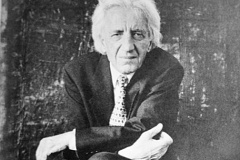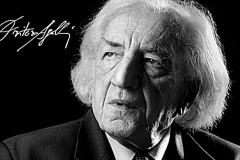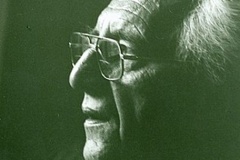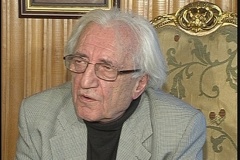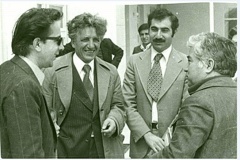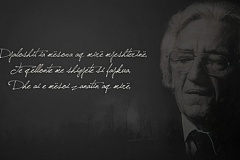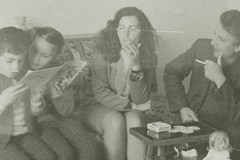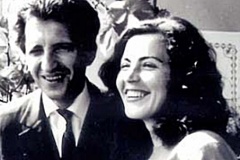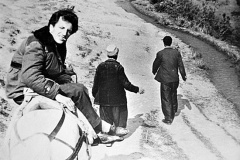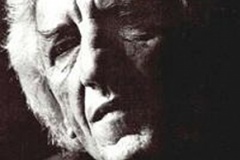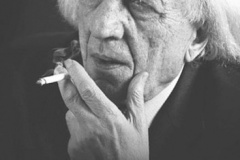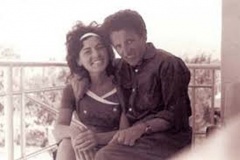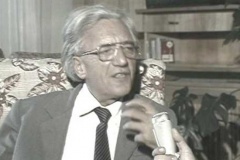Dritëro Agolli (1931-2017)
Playwright, screenwriter, outstanding writer of Albanian literature, publicist and political activist. To write about such a figure as Dritero Agolli naturally requires whole pages, and professional researchers, however we will try to bring for all the followers of this page a reduced profile and go from the scenic art of the master of Albanian letters.
Dritëro Agolli was born in Menkulas of Devolli on October 13, 1931. After receiving his first lessons in his hometown, he continued to Gjirokastra high school, a school with a lot of tradition. He finished his higher studies in literature in Petersburg. He worked for a long time as a journalist in the daily newspaper “Zëri i popullit”, and for many years he was the Chairman of the League of Writers and Artists of Albania (1973-1992). He was also a deputy of the popular assembly in several legislatures. His literary creativity is quite rich in different genres and types: poems, poems, stories, novels, novels, dramas, film scripts, etc. It is the winner of several awards and other honors. Some of his most important works have been translated in the West and in the East.
Dritëro Agolli entered Albanian literature from the beginning (60s) as its protagonist, changing the size of the future. In Agolli’s work, he saw himself as the protagonist of the farmer and the shepherd, the peasant and the student, the mountaineer and the farmer. Agolli became the poet of the earth and of love for it, the writer of philosophy and human pain. The literary work of Dritëro Agolli created the new tradition of Albanian literature. It makes us feel dignified in front of the big world.
A great writer of a “small language”, he is as loved by his fellow readers as he is in the metropolises of world culture. Dritëro Agolli and his literary generation (the 60s) did not come up with any new poetics, however, there was a lot of discussion about rhyme and rhythm, about free verse and regular verse, about the “strictness” of poetry. His creative experience, rather than theoretical treatises, led to a radical change in the Albanian rhyming tradition. Dritëro Agolli appeared in literature as an author with high demands for poetry. He aimed for a more personal poem, with more individuality. Agolli created the poetry of the “un”, in contrast to the poetry of “we”, which was written “to unite the masses”.
Agolli created a new model of rhyming in problem and literary skill, he naturally interwoven the traditional values of poetry with new ways of poetic expression . Simplicity of communication, universal messages and open expression of empathy are the strong pillars on which his poetry rests. In his prose, Agolli brought innovation not only in the narrative structure, but also in the gallery of his characters. They left the strange as well as the ordinary, the tragic as well as the comic, the simple as well as the grand.
The rich popular phraseology and life philosophy generally make the entire literary work of Agolli among the most read today. Many of his works have been translated into foreign languages. Driteroi is the author of the plays: “Second Face” (1968) staged according to the direction of Pirro Mani; “White Age”; “Ballad for a woman”; In cinematography, he has written several documentaries and feature film scripts. In 1968, “Open Horizon” marks his path towards the script of the feature film. Some of his most popular works have also found their way to the cinema screen, such as the novel “Commissioner Memo” 1970 (the movie “I teti ne bronx”); the novel and film “The Man with the Cannon” – 1977; “Stories of Mother Pashako and her sons” (film “Stars of the long nights” 1973); “Good Man” (1982), winner of the Cup of the 5th Albanian Film Festival, or the poem “Partizani Meke” (the movie The Emperor’s Bed, 1973), etc.
In some of them, he was also a co-screenwriter. Some of his works have also been dramatized on the stage of the Theater, such as “Commissary Memo” (the play Time of Commissaries given in the Aleksander Moisiu Theater – Durres), “Man with Cannon” has appeared in dramas from the theaters of Gjirokastra and Gjakova, ” The Rise and Fall of Comrade Zylo” from the Teatri Popullor.
Likewise, the documentaries “Your way friend” (1970); “Mother Albania” (based on the poem of the same name) 1979. D. Agolli with his creations in the field of dramaturgy, as well as in the script of the feature film, brought subjects with strong dramatic, tragic but also lyrical charges, brought shocking events and events. He has also written the libretto for the opera “Commissar” by Nikolla Zoraq, as well as many song texts that have received awards at Festivals in RTSH. Dritero Agolli, is a member of the Academy of Sciences of Albania and in March In 1999, by decree of the President of the Republic of Albania, he was given the title “Honour of the Nation”.
He passed away on February 3, 2017. Author’s poems: Devoll Devoll;
Mountain poems; My steps on the asphalt Mother Albania; Fathers; The poem of the road; Poems for fathers and for themselves; Complaints; Barber; Elegy for the dog; Ender cut; Cooling Silence; The stalker of love; This night with the autumn moon, I will not be here; Later time; When I returned from the sea; When one morning Longing for heroes, etc.
Titles of the works: On the Dolla Road, 1958 My Steps on the Asphalt, 1961 The Sound of Old Winds, 1964 Mountain Paths and Pavements, 1965 Noon, 1968 Mother Albania, poem, 1974 The Word Carves the Stone, 1977 Commissar Memo, novel, 1969 Man with Cannon, novel, 1975 The Rise and Fall of Friend Zylo, novel 1973 Rose in the Glass, novel, 1980 The Second Face, drama The White Age, drama I Travel Thoughtfully, 1985 The Good Man, stories The Naked Knight, novel The Devil’s Chest,
1998 Published for the first time in October 2018 on the Facebook page of “Albanian Cinematography” and revised in the following years!
_____________________________
Albanian Cinematography in activity since 2013 Reference: “poezishqip.com”; “Encyclopedia of Albanian Theater and Cinematography” / p.9-10 / J. Papagjoni
Follow us: Blog: https://albaniancinematography.blogspot.com/ Vimeo: Albanian Cinematography (vimeo.com) Facebook: https://www.facebook.com/ksh.faqjazyrtare Dailymotion: https://www.dailymotion.com/kinetografiashqiptareartisporti YouTube: https://www.youtube.com/channel/UCDRYQ5xCyGkfELm3mX8Rhtw
Discover more from Albanian Cinematography - Sport
Subscribe to get the latest posts sent to your email.

